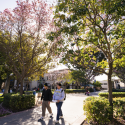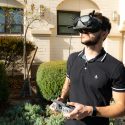Entering Scholars Program Redefines the Freshman Experience
This fall, more than 700 freshmen are benefiting from a program designed to link English and reading courses with academic support services during their first year in college.
The Entering Scholars Program (ESP) focuses on providing academic support and fostering connections for students on campus. ESP classes stand out from other classes because they incorporate activities and support services such as in-class peer-tutoring and personalized classroom visits from counselors and campus staff. The goal of ESP is to target first-year students in English and reading courses and offer them a course curriculum comprised of study skills, educational planning, self-exploration, engagement and learning resources.
“Students who are integrated into their college environment develop a sense of belonging and motivation to continue working toward their academic goals,” said Kristine Nikkhoo, director of Basic Skills at Fullerton College. “ESP gives students a way to build a support network early on that will last the whole time they study at Fullerton College.”
Through a collaborative effort with funding support from the Basic Skills Initiative and Student Equity Initiative, the program has grown from six classes in 2010 to 28 classes this semester. The program started out with only basic skills courses, which are classes that focus on the foundation of English, reading, or math, and are not college-level transferable courses. During the past five years, it has grown from 300 students to about 1,400 students per year. After seeing noted success by its students, faculty and staff expanded the course offerings in 2014 to include 14 transfer-level courses in English and reading.
Between counselor visits, tutoring, and presentations from classified staff members known as Student Support Professionals (SSPs), freshmen become familiar with the multitude of resources available to them in the first few weeks of the semester. This enables them to build skills, gain confidence, and succeed during future semesters.
“Fostering student success in the freshman year is the most significant intervention an institution can make in the name of student persistence…The freshman’s most critical transition period occurs during the first two to six weeks,” writes Andi Levitz and Lee Noel in the scholarly article Connecting Students to Institutions: Keys to Retention and Success. ESP adopted these key fundamentals when establishing the components of the program.
One unique feature of ESP is how classified staff members are integrated into the classroom. SSPs attend an ESP class four times during the semester to discuss relevant topics provided by the program and to serve as a campus liaison to students. At least two presentations are made during the first four weeks of the semester, which is a critical time for new students. During the second visit, which usually occurs during the fourth week, the SSP gives a campus resource presentation and provides a 30-minute informational activity to help the students in class become familiar with resources on campus. In addition, they invite students to visit their offices and spend time with the students outside of class to answer questions, provide support, or simply be a friendly face on campus. This helps accomplish the program’s goal of increasing student familiarity with and access to academic support services on campus.
“We’re helping to build our campus community,” Nikkhoo said.
Counselors and tutors play another critical role in the program. Counselor visits to ESP classes are intended to help students understand the importance of developing their educational plans and goals, while peer-tutors provide academic support inside and outside of class.
“Faculty and tutors support students by addressing the affective domain – helping students develop life skills and strategies such as having a growth mindset and practicing mindfulness and persistence,” Nikkhoo added. According to Nikkhoo, embedded peer-tutors have a great potential to positively impact student success in the program. Their role is to assist the instructor with presentations and activities, model what an effective student looks like in the classroom, and provide extra support for students as it relates to course content and the affective domain.
Additionally, faculty members incorporate basic skills pedagogy into their curriculum with lessons on note taking, time management, test preparation, stress management, and metacognitive reflection. As a result, students are better equipped to be successful in all of their classes.
It’s a program that is certainly benefiting students in the long run. Recent progression data indicates ESP students have a 12.2 percent higher success rate than the average student in a transfer-level English class after completing an ESP course. In addition, students exiting the program develop confidence in their study skills, and are better equipped to handle stress, or at least know who to turn to for help through the connections and academic support they’ve experienced in the program.
This fall, students were quick to enroll in all 28 course sections. ESP courses are noted in the class schedule each semester and students can enroll in an ESP course during the registration process.
For more information on the Entering Scholars Program visit http://basicskills.fullcoll.edu/esp.htm or call (714) 992-7170.






